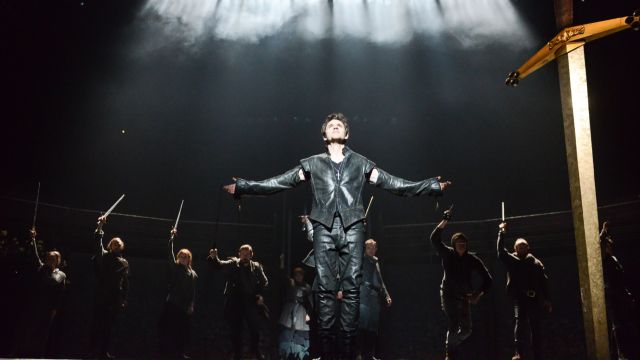The James Plays
Three generations of Scotland’s Stewart Monarchy are covered in this ambitious trilogy of historical plays – each of which combine cutthroat political intrigue, heated romantic tension and irreverent comic flourishes with thrilling visual spectacle and stirring musical accompaniment. Each instalment can stand alone as a powerful, provocative work, but taken as a whole, The James Plays are an epic for the ages and amongst the finest theatrical achievements of the 21st century thus far.
The first instalment, The Key Will Keep The Lock, sees James I (Steven Miller), return to his homeland after living over a decade as a prisoner of Henry V (Matthew Pidgeon). Not yet thirty, unschooled in the ways of love and war, the young King has his hands full adjusting to married life with the English lady, Joan (Rosemary Boyle) and uniting the feuding Scottish aristocracy under his rule…. the most balanced of the three plays, this instalment offers an even mix of political drama, aggressive military action and amiable romantic comedy. Miller and Boyle both manage a difficult balancing act, coming across as convincingly green and unseasoned, yet at the same time intelligent and determined, sparks fly between them at just the right moments. Pidgeon’s Henry is a compelling mix of world-weary cynicism and thuggish petulance. Also impressive is Sally Reid, who brings a fiery, spitfire wit to the role of Joan’s sassy maid. The scheming nobles played by John Stahl, Blythe Duff and Peter Forbes have some striking moments, but don’t really shine until their roles are expanded in the second chapter.
Day Of The Innocents sees the protagonists of the first play violently deposed and six year old James II (Daniel Cahill) installed as a puppet ruler. Abandoned by his mother, separated from his sisters and cruelly abused by his legal guardian, the child king is left with deep psychological scars. Yet as he grows to manhood, James II finds the courage to snap the strings of his puppet masters and forges his own destiny with the help of his friend William (Andrew Still) and eventually manages to slay the demons of self-doubt that afflict his mind with the tough-love of his wife Mary (Boyle again in a Freudian bit of double casting). But even once he has ensured the crown for himself, brutal decisions must be made in order to preserve his legacy for the next generation… the darkest instalment of the trilogy by far, the early scenes have a hallucinatory, surreal nightmare quality that is disorienting even if you’ve seen the first chapter. But after the first 15 minutes or so, things settle down and it becomes a more grounded coming of age story. All of the cast have moments that are frighteningly intense, but it’s Cahill that commands the audience’s attention from start to finish. Having to progress from playing an innocent, wimpy child to a middle aged, authoritative leader of men, Cahill makes such an extreme transformation seem only natural.

The third instalment is the lightest of all, and of the three, probably works best as a standalone piece. The True Mirror sees James III (Pidgeon again) in the grips of a midlife crisis, embarking upon a wildly extravagant spree of debauched hedonism. James III’s brazen infidelities with both men and women alienate his family, whilst his reckless spending on grandiose monuments to his own brilliance pushes the royal treasury to the brink of bankruptcy. It falls upon The King’s pragmatic Danish wife, Margaret (Malin Crepin) to avert civil war, turn round the economy and try to salvage James’ dignity… hilarious and inspired in its mix of highbrow and lowbrow humour, not a minute went by when the audience weren’t laughing with delight. Pidgeon has a certain charm, even in his most manic moments and Crepin’s steely, quietly assured charisma is the perfect foil for his oddball antics. The True Mirror compares quite favourably to both The Lion In Winter and The Madness Of King George, and it’s a pretty safe bet that if you found those two works amusing, you’ll have a blast with this.
Though the sets and costumes have a strong period flavour, the dialogue is written in a contemporary style, with generous servings of “The F Word”. Explicit violence and sexuality is present in all three plays, and each contains one or two scenes that go for an easy laugh or cheap thrill through the use of shock tactics. Liberties have been taken with the historical record which, though relatively minor, are likely to upset historical purists. The squeamish and easily offended will therefore find much of the proceedings offputing, though the plotting and characterisation are intelligently constructed, the dialogue equally clever, despite its anachronistic style. Still, these are minor nitpicks that won’t even register with many theatregoers. The overall quality of production is everything one can reasonably expect from professional theatre and The James Plays will probably be remembered as the jewel in the crown of 2016’s Adelaide Festival.
Benjamin Orchard
Images: Robert Day, Adelaide Festival of Arts
Subscribe to our E-Newsletter, buy our latest print edition or find a Performing Arts book at Book Nook.

